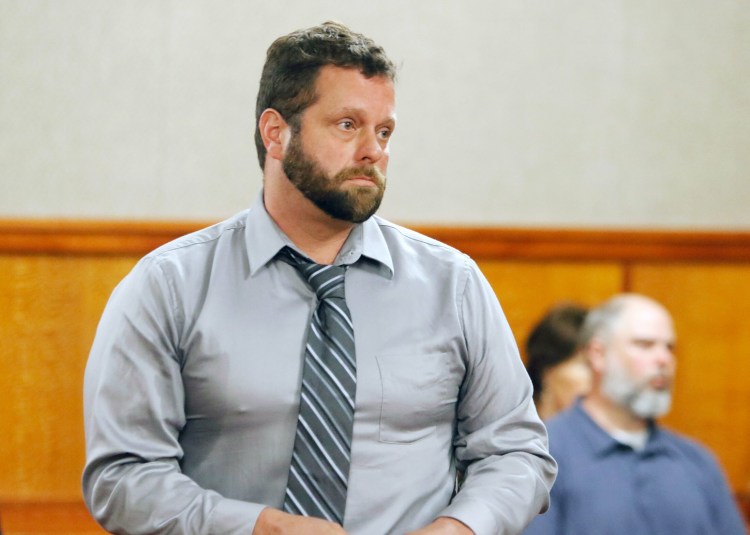The family of a roofer who died in a fall while on the job in Portland has filed a $2.5 million wrongful death lawsuit against his former employer, alleging that the company owner discouraged the use of safety equipment that could have prevented the death.
The lawsuit was filed Friday in York County Superior Court on behalf of the estate of Alan Loignon, 30, who fell to his death from a third story roof on Munjoy Hill on Dec. 13. Loignon was working for Purvis Home Improvement Inc. of Scarborough, which is owned and operated by Shawn D. Purvis. Loignon was not wearing a safety harness when he fell.
Purvis and Loignon were half-brothers.
Purvis, 44, also faces criminal charges in the death, and has pleaded not guilty to one count each of Class A manslaughter and Class C workplace manslaughter. Prosecutors allege that Purvis did not enforce standards of the Occupational Safety and Health Administration that require employers to provide fall protection for any workers exposed to unprotected drops of 6 feet or more, and that Loignon’s death was a foreseeable result for which Purvis is responsible.
In addition to the criminal charges, Purvis also faces a federal collection action on more than $54,000 in unpaid fines and fees for prior OSHA violations for failing to require that his workers wear safety gear.
The lawsuit alleges that Purvis discouraged the use of safety gear so his crews could finish roofing jobs faster. Thomas Hallett, Purvis’ attorney, declined to comment, and said he not yet been served with the lawsuit.
Loignon was engaged to marry Kristina Huff and the couple have two daughters. Huff is the personal representative for Loignon’s estate and a party to the lawsuit.

Workers from Purvis Home Improvements of Scarborough were back on the job at a home on Munjoy Hill in Portland the day after a worker died in a fall from the roof in December. Ben McCanna/Staff Photographer
“It is outrageous to cut safety in hopes of getting a job done quicker and more profitably,” said Michael Bigos, one of Huff’s attorneys. “This lawsuit will show that roofing companies need to get the job done right and get it done safely. That’s good business. And we should never put profits ahead of safety.”
In an interview published before the lawsuit was filed, Purvis said he provides safety gear for all jobs, but could not force workers to use it.
“Every single day, I show up at the job site … and I tell them, please, be safe, everything you need is here,” Purvis said in the interview in April. “I can’t sit there 24/7 and watch subcontractors. It’s either they’re going to wear (the safety gear) or they won’t. It’s like wearing a seat belt, it’s either you do it or you don’t.”
He added later: “I can supply everything to be OSHA approved, but I can’t sit there and watch these guys all day long. That’s their job. They’re self-employed.”
Attorneys for Huff also took steps in court Friday for attachment, a process by which attorneys identify assets owned by Purvis that could be used to pay a future judgment against him. Although the lawsuit does not identify a dollar figure, Huff’s attorneys argue that she is likely to recover up to $2.5 million at trial and requests that a judge freeze Purvis’s real estate and bank assets pending the outcome of the case.
Under federal workplace safety laws, employers must require their employees to use safety equipment such as fall harnesses, or make accommodations to prevent falls, such as installing temporary handrails or catch nets, when workers are exposed to unprotected drops of six feet or more.
But Purvis argued that he is not an employer and instead hires independent subcontractors, and while he encourages workers to use the extensive collection of safety gear he provides, he cannot force them to comply. Purvis said he has battled OSHA for a dozen years over this point, and has refused to pay the roughly $44,000 in fines the safety agency has tried to levy against him. He also has accrued $10,000 in fees and penalties.
But the Maine Department of Labor and a roofing industry group say Purvis is mistaken.
Under federal OSHA guidelines, any contractor whose worker is exposed to a drop of more than 6 feet where there is no guardrail is required to make sure workers use fall protection, whether by personal safety harnesses, catch nets or other fall-arresting systems.
The National Roofing Legal Resource Center also advises its members that even if they classify their workers as subcontractors, the person or entity that controls a job site is still responsible to ensure workers on the job follow guidelines.
Comments are not available on this story.
Send questions/comments to the editors.



